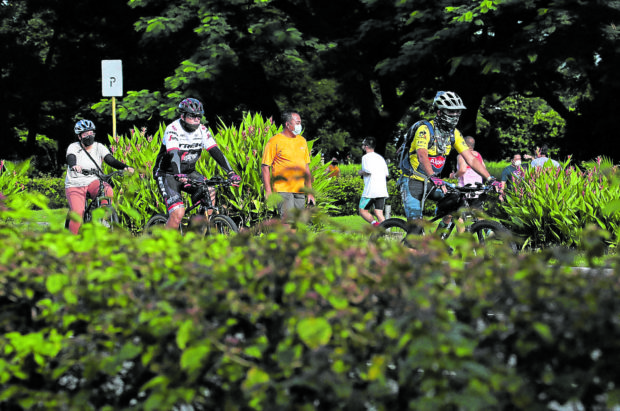Pinoys less wary now to leave their homes – wellness survey

BREATH OF FRESH AIR: The crowd of bikers and joggers on University Avenue on the University of the Philippines campus in Quezon City appears to grow every weekend, thanks to eased pandemic curbs — and reduced anxieties—as the government ramps up mass vaccination. (Photo by NIÑO JESUS ORBETA / Philippine Daily Inquirer)
MANILA, Philippines — A recent wellness survey has found that compared to the onset of the COVID-19 pandemic, Filipinos, especially those part of the workforce, are now less anxious to go out of their homes.
Respondents to the 2021 PhilCare Wellness Index: The Philippine Roadmap to the Next Normal said they were more comfortable going to a hospital or doing their groceries now, compared to last year.
The survey, conducted via phone from Sept. 4 to Sept. 20, involved 1,500 individuals, lead researcher Dr. Fernando Paragas said at a media briefing on the results of the Wellness Index.
Respondents were randomly selected from Metro Manila and over 60 provinces across the country. All respondents are currently employed, with the majority working in the services sector (81.9 percent), followed by those in the industrial (16 percent) and agricultural sectors (2.1 percent).
During the survey, respondents were asked to rate certain scenarios on a five-point scale.
Article continues after this advertisementMore at ease now
The scores were later tabulated, with “strongly agree,” given the corresponding value of 1-1.80, while, “agree” was given a value range of 1.81-2.60. The answer of “neither” was plotted at 2.61-3.40, “disagree” at 3.41 to 4.20 and “strongly disagree” was assigned the values 4.21-5,00. The 2021 survey is the fourth such survey conducted by Health Maintenance Organization PhilCare.
Article continues after this advertisementAccording to Paragas, when compared with PhilCare’s 2020 Wellness Index survey when the majority disagreed (3.93) that they were comfortable with going to the hospital amid the pandemic, in 2021, the mean score jumped to 3.05, meaning respondents neither agree nor disagree with the statement.
Respondents in 2021 are now more at ease when going to the supermarket, the survey found.
It also appears that Filipinos are less cautious now compared to the start of the pandemic.
Dr. Enrique Ona, chair of the 2021 PhilCare Wellness Index and a former health secretary, said the survey showed that Filipinos were slowly accepting that COVID-19 was something that was “not to be feared anymore but something to live with.”
An overwhelming majority, or 82 percent, of the respondents also said they were confident with the COVID-19 vaccinations.
Meanwhile, the government aims to fully vaccinate 70 percent of the population by February 2022, which is later than the initial target it set of accomplishing this goal by the end of 2021.
70% fully vaccinated by Feb
Secretary Carlito Galvez Jr., the chief implementer of the National Task Force Against COVID-19, said the task force wanted to vaccinate the targeted population before the election period begins in February so that campaigning would be safe and would not lead to more coronavirus infections.
The government’s target is 70 percent of the population, but he noted that experts had recommended that this be increased to 80 to 90 percent because of the more infectious variants.
“Realistically, what we see based on our computations is that more or less, the most achievable for us is 50 percent [by the end of the year],” he said at a Palace press briefing on Monday.
The Department of Science and Technology (DOST) on Tuesday said moving forward, vaccine clinical trial applications in the country had a bigger chance of being approved if it would cover special groups such as pediatric patients, or if the said vaccine was delivered using new platforms such as DNA vaccines.
In an online media forum, Jaime Montoya, director of the DOST Philippine Council for Health Research and Development, said the country was no longer keen on allowing clinical trials that target the general population, or that use older platforms, including mRNA vaccines or inactivated viruses.
“The IATF (Inter-Agency Task Force for the Management of Emerging Infectious Disease) has also approved the proposal to limit clinical trials to be done in the country to those vaccines that would be for new indications,” Montoya said.
He said the country already had “a lot” of clinical trials that look at the usual age of the general population, so the department would “prioritize” special groups, such as children.